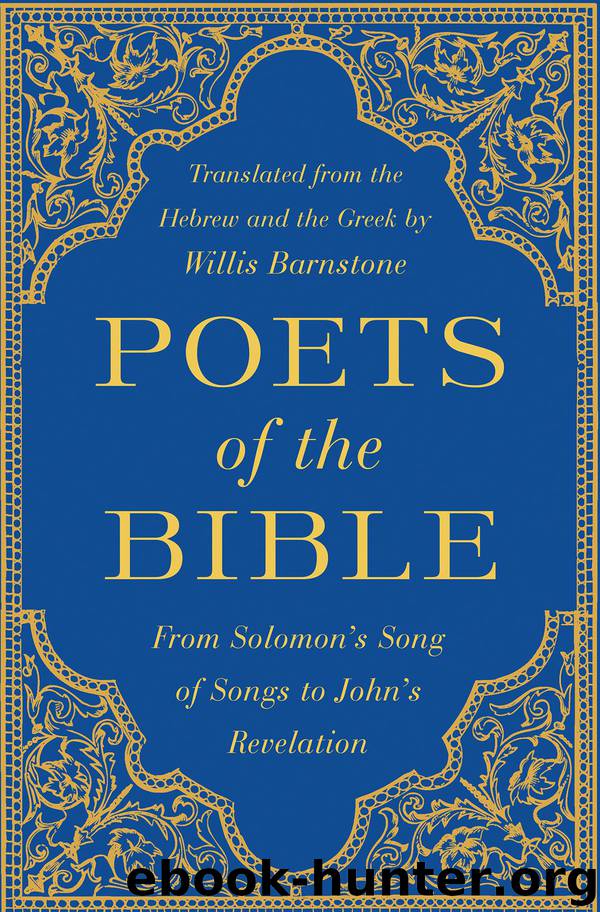Poets of the Bible by Willis Barnstone

Author:Willis Barnstone
Language: eng
Format: epub
Publisher: W. W. Norton & Company
Published: 2017-03-17T04:00:00+00:00
As a young, itinerant rabbi, Jesus is alert to every frailty. A woman falls to her knees, begging the savior to touch her or her child and enact a cure; the man living in the tombs, possessed by demons, asks Jesus whether he, too, has come to torment him, and then, cured by Jesus, begs, unsuccessfully, to accompany him on his wanderings. The unclean are cleansed, the leper is washed, the hungry receive bread, the prostitute is not scorned, the woman (one of the Miryams, wandering in the garden) discovers a resurrected crucified walking near her, who touches her with hope. All these are the figures of the human landscape that the New Covenant delivers without makeup or guise.
We must also never forget the ultimate drama of each of the canonical gospels: the agony of the last hours of Jesus’s life, when the “King of the Jews,” an itinerant wisdom rabbi whom the Roman conquerors nail to a T-cross, calls out in despair as he gives up the ghost on a Friday afternoon, shouting in Hebrew, from Psalm 22, line 1, “My God, my God, why hast thou forsaken me?” In response, the earth quakes and the sky blackens and cracks. And the drama of religions has its terrible mystery of death. The story of suffering for the good is a universal theme. To tell it, as we see, the Markan rhetoric is not of learned Cicero, Proust, and Henry James, but in the elegant plain talk of Mark Twain, Emily Dickinson, and Hemingway. On stage are dramatic metaphors of rich and poor, of food and hunger, of the leper seeking cure, the prostitute who loves Jesus’s body. And going back to Erasmus’s declaration of the plowboy of the fields, Mark’s Koine Greek, whatever its source, is the right vehicle for the abundant wisdom poetry of Yeshua son of Yosef and Miryam (Jesus, son of Joseph and Mary).
As noted earlier for the Hebrew Bible, the English names of all figures appear in titles. In the text itself we use their restored names. They were after all not from London or Washington, but from cities and villages along the western coast of Asia Minor.
Download
This site does not store any files on its server. We only index and link to content provided by other sites. Please contact the content providers to delete copyright contents if any and email us, we'll remove relevant links or contents immediately.
The Universe of Us by Lang Leav(15065)
The Sun and Her Flowers by Rupi Kaur(14508)
Adultolescence by Gabbie Hanna(8912)
Whiskey Words & a Shovel II by r.h. Sin(8006)
Love Her Wild by Atticus(7745)
Smoke & Mirrors by Michael Faudet(6182)
Wiseguy by Nicholas Pileggi(5767)
The Princess Saves Herself in This One by Amanda Lovelace(4964)
Love & Misadventure by Lang Leav(4841)
Memories by Lang Leav(4794)
Milk and Honey by Rupi Kaur(4739)
Bluets by Maggie Nelson(4544)
Too Much and Not the Mood by Durga Chew-Bose(4334)
Pillow Thoughts by Courtney Peppernell(4271)
Good morning to Goodnight by Eleni Kaur(4228)
The Poetry of Pablo Neruda by Pablo Neruda(4091)
Algedonic by r.h. Sin(4056)
HER II by Pierre Alex Jeanty(3604)
Stuff I've Been Feeling Lately by Alicia Cook(3448)
